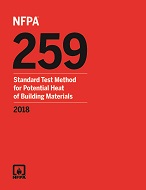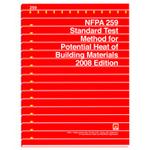
NFPA (Fire) 259
- Comments Off on NFPA (Fire) 259
- NFPA-FIRE
Product Details
- Published:
- 11/29/2022
- ISBN(s):
- 9781455929764
- ANSI:
- ANSI Approved
- Number of Pages:
- 19
- Note:
- This product is unavailable in Ukraine, Russia, Belarus





Click here to purchase
Accurately measure the potential heat of building materials using today’s NFPA 259. Protect lives and property from potential fire hazards in the built environment.
Essential for fire test labs, manufacturers, fire protection engineers, and fire researchers, the 2018 edition of NFPA 259: Standard Test Method of Potential Heat of Building Materials offers a test method that provides a means of determining — under controlled laboratory conditions — the potential heat of building materials subjected to a defined high-temperature exposure condition. The method yields a property-type measurement of the amount of heat that can potentially be given off by building materials when exposed to a heat source.
Added information in the 2018 edition gives designers and engineers more guidance.
Annexes written by fire protection experts provide additional support, including explanatory material, and potential heat of selected building materials. The 2018 edition includes new Annex B material on the use of potential heat data.




Click here to purchase
Protect lives and property. Measure the potential heat of building materials with the up-to-date criteria in the 2013 edition of NFPA 259.
Essential for fire test labs, manufacturers, fire protection engineers, and fire researchers, the 2013 edition of NFPA 259: Standard Test Method of Potential Heat of Building Materials offers a test method that provides a means of determining — under controlled laboratory conditions — the potential heat of building materials subjected to a defined high-temperature exposure condition.
The method yields a property-type measurement of the amount of heat that can potentially be given off by building materials when exposed to a heat source.
Keep pace with changes in the 2013 edition, including:
Accurate assessments require the latest guidelines. Make sure you’re up-to-date with the 2013 NFPA 259.



